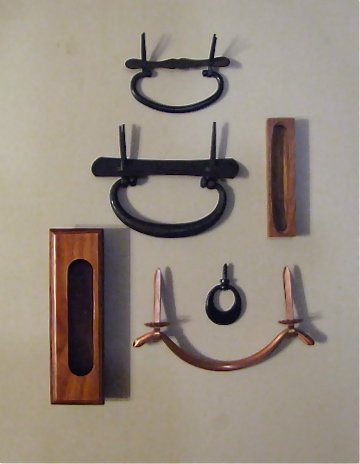Jewelry for wood
After our last blog about invisible hardware, we couldn’t resist a paragraph about “jewelry for wood”. We have a weakness for beautiful hinges and hardware. When appropriate, we like to incorporate them into a project for a hidden surprise as you move your shoji. Here’s a small sampling of some “hidden gems.”
Distinctive hinges in solid brass, stainless steel, chrome
When we first started out, we were dissatisfied with the standard two-way hinges made. Although they were quite functional, we didn’t like their appearance or size. They seemed to stand out too much and lacked the fine finish we were after. One afternoon, a colleague at McGuire Furniture suggested, “Why don’t you design your own?” (Thank you Frank!)
Having never considered it, we were a bit intimidated. But after a few sketches, our double-acting loose pin hinge was born. Fashioned from solid brass, it allows you to order multiple hinged panels, and easily separate them as needed (ie a 6-panel becomes two 3-panel units, or split into a 4-panel and a 2-panel, etc.)
So, that’s where our search for the perfect hardware began and continues to this day.
Traditional Japanese pulls we like to use at Design Shoji
Most of the time we like to route hand pulls directly into the stile of the shoji for the cleanest look. However, we would be remiss not to include some of the beautiful Japanese wrought iron and wood pulls available when a more decorative look is desired. There are many sizes and finishes; these are some of our favorite. Appropriate for custom tansu or shoji screens, these add a classic touch to our Design Shoji projects.
As you know, it doesn’t take much hardware to overpower the delicate design balance of a shoji panel. But sometimes, you may want to “dress up” a shoji screen; we like looking for the perfect accent hardware your doors may require.
We’re sure you can tell we don’t like to build the same thing twice. We like customizing each project, all they way down to the tiniest hardware details. We’re not sure if that’s good or bad, but it’s how we approach each shoji screen we make. If you are going to put the energy and time into ordering a custom shoji door, it’s up to Brian, the woodworker, to build you something functional, beautiful and unique to your space. Your shoji should stand out as custom-made for you, just as any custom-designed piece of furniture would not be confused for a mass-produced stock piece.
Little details make a big difference in the shibui-style of Japanese design. For us, hardware is one of those critical elements that go into a successful shoji installation — whether you see it or not!


